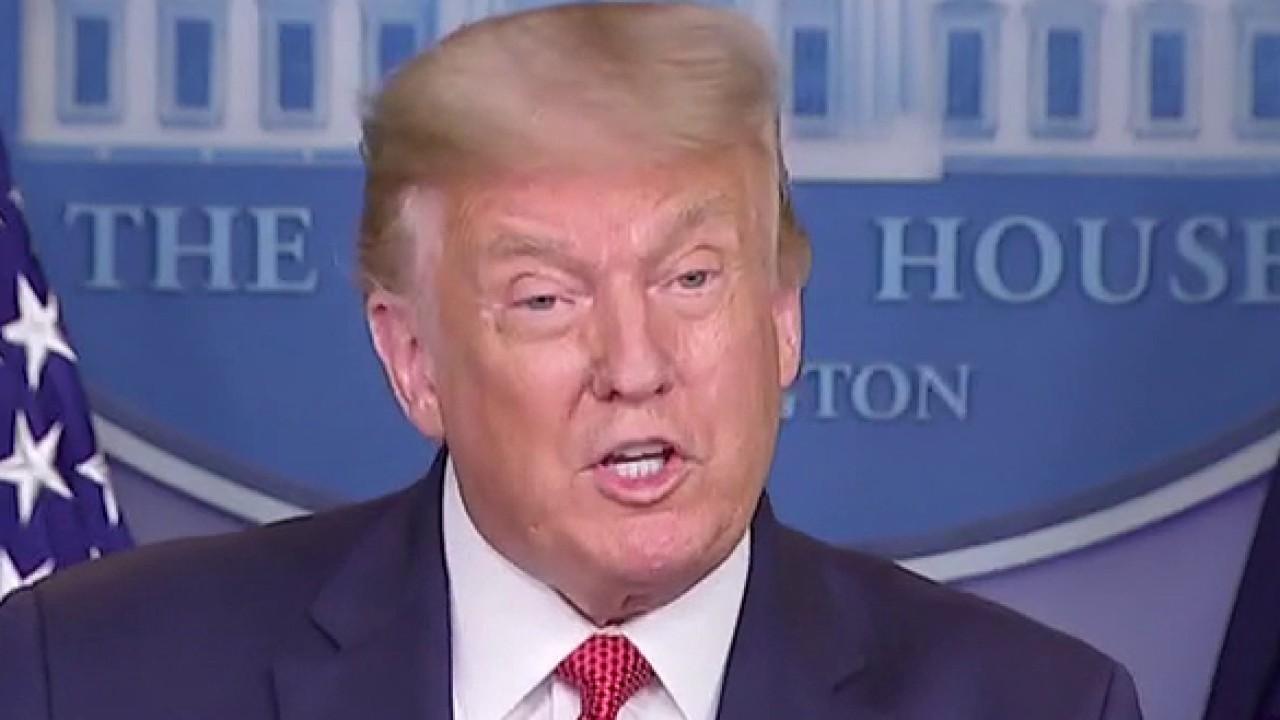How much will Trump's coronavirus executive actions cost?
The country's deficit is on track to hit $3.7 trillion in fiscal 2020
President Trump bypassed a deadlocked Congress on coronavirus relief over the weekend, passing four executive actions intended to provide relief to American workers and businesses during the pandemic.
Trump's orders, which came after negotiations over another aid package hit an impasse on Capitol Hill, would postpone the collection of payroll taxes for individuals earning less than $104,000 annually through the remainder of the year; partially restore supplemental unemployment benefits at $400 per week (25% of which would come from cash-strapped state's budgets), extend student loan relief and discourage evictions.
CALCULATE HOW MUCH MONEY YOU'D RECEIVE FROM THE SECOND STIMULUS CHECK HERE
Combined, the four measures would inject about $165 billion of liquidity into the U.S. economy in the short-term and add about $10 billion to the nation's ballooning deficit, according to new projections released by the Center for a Responsible Federal Budget.
Because a portion of the money in the orders has already been allocated and the collection of payroll taxes are postponed until a later date but not canceled, the actions will not substantially add to the nation's deficit.
For instance, Trump's memorandum that authorizes states to pay $400 a week in additional jobless aid only funded $300 of that using $44 billion from the Disaster Relief Fund, the government's primary source of emergency funding. The remaining $100 is supposed to come from the state governments.
NEARLY HALF OF US JOBS LOST TO CORONAVIRUS COULD BE GONE PERMANENTLY, POLL FINDS
"We estimate that the program would have sufficient funding for five weeks of benefits (through August 29)," the analysis found. "Because the money was already appropriated to the Disaster Relief Fund, some by the CARES Act and some by previous legislation, this money could have been spent already so choosing it to spend on unemployment will have no additional deficit impact."
The bipartisan nonprofit, based in Washington, D.C., noted that up to $100 billion in payroll taxes could be delayed as a result of Trump's order, which postponed the collection of payroll taxes from Sept. 1 through Dec. 31 for individuals earning less than $104,000 annually, or less than $2,000 per week.
"Because most of these taxes would be repaid later, we estimate a deficit impact of roughly $5 billion," the organization said.
The gap between what the federal government collects and what it spends is projected to exceed $3.7 trillion in fiscal 2020, according to the Congressional Budget Office, a record-shattering number that dwarfs the previous high of $1.41 trillion set in 2009 during the global financial crisis.
FED UNDERSCORES SUPPORT FOR ECONOMIC RECOVERY THREATENED BY VIRUS RESURGENCE
However, some of his proposals would likely face legal challenges. The Constitution gives Congress the power of federal spending, and critics say Trump does not have the legal authority to issue executive orders allocating how much money should be spent on the pandemic. In addition, the National Governors Association said in a statement that it would be better for Congress to pass a comprehensive package of federal benefits rather than the White House's executive actions.
So far, Congress has passed three massive stimulus packages totaling nearly $3 trillion to help American workers and businesses survive the worst downturn since the Great Depression.
But work on a fourth package stalled out amid a dispute between Republicans and Democrats over how much it should cost. Senate Republicans introduced a package that was estimated to cost $1 trillion, while House Democrats passed a bill in May that proposed $3.4 trillion more in spending.
GET FOX BUSINESS ON THE GO BY CLICKING HERE




















